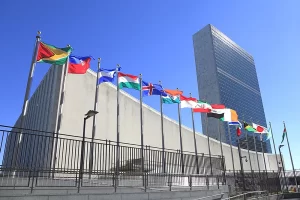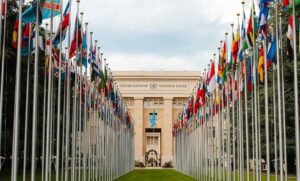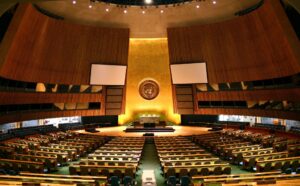
 On October 24, 1945, the United Nations Charter, adopted and signed on June 26, 1945, came into effect. The United Nations (UN) emerged from a “perceived” need for a mechanism superior to the League of Nations in arbitrating international conflicts and negotiating peace. The escalating Second World War prompted the United States, Britain, and the Soviet Union to draft the initial UN Declaration, which 26 nations signed in January 1942 as an official stance against the Axis Powers of Germany, Italy, and Japan. It all seemed like a good idea, and perhaps was drafted with good intentions, but it is my opinion that the UN has failed miserably to accomplish any of the goals it set out to achieve.
On October 24, 1945, the United Nations Charter, adopted and signed on June 26, 1945, came into effect. The United Nations (UN) emerged from a “perceived” need for a mechanism superior to the League of Nations in arbitrating international conflicts and negotiating peace. The escalating Second World War prompted the United States, Britain, and the Soviet Union to draft the initial UN Declaration, which 26 nations signed in January 1942 as an official stance against the Axis Powers of Germany, Italy, and Japan. It all seemed like a good idea, and perhaps was drafted with good intentions, but it is my opinion that the UN has failed miserably to accomplish any of the goals it set out to achieve.
The foundational principles of the UN Charter were initially shaped during the San Francisco Conference, which began on April 25, 1945. This conference established the framework for a new international organization intended to “save succeeding generations from the scourge of war, to reaffirm faith in fundamental human rights, to establish conditions under which justice and respect for the obligations arising from treaties and other sources of international law can be maintained, and to promote social progress and better standards of life in larger freedom.” The Charter further outlined two additional vital goals. They were to maintain the principles of equal rights and self-determination for all peoples…initially intended to safeguard smaller nations at risk of being overtaken by the larger Communist powers emerging after the war, and to promote international collaboration to tackle worldwide economic, social, cultural, and humanitarian issues.
Following the war’s end, the responsibility of negotiating and maintaining peace was assigned to the newly established UN Security Council, which included the United States, Great Britain, France, the Soviet Union, and China. Each member possessed veto power. Winston Churchill implored the United Nations to employ its charter to promote a new, united Europe…a unity characterized by its opposition to communist expansion in both the East and the West. Yet, given the composition of the Security Council, achieving this proved more challenging than anticipated. I suppose that the distain felt by many people, for the United Nations, could have arisen from an impossible task, but more likely it came from flawed people who placed their own agenda ahead of the real needs of the people.
The United Nations is subject to criticism for a variety of reasons, including its policies, ideology, equality of representation, administrative practices, enforcement of decisions, and perceived ideological biases. Critics often cite a lack of success within the organization, noting failures in both preventative measures and in de-escalating conflicts ranging from social disputes to full-blown wars. Additional criticisms involve accusations of antisemitism, appeasement, collusion, promotion of globalism, inaction, and the exertion of undue influence by 
 powerful nations within the General Assembly, as well as corruption and misallocation of resources. In my opinion, and that of many other people, that the UN should be dissolved, or at the very least, that the United States should withdraw and expel the United Nations from this nation. While some may disagree, this is my viewpoint.
powerful nations within the General Assembly, as well as corruption and misallocation of resources. In my opinion, and that of many other people, that the UN should be dissolved, or at the very least, that the United States should withdraw and expel the United Nations from this nation. While some may disagree, this is my viewpoint.


Leave a Reply